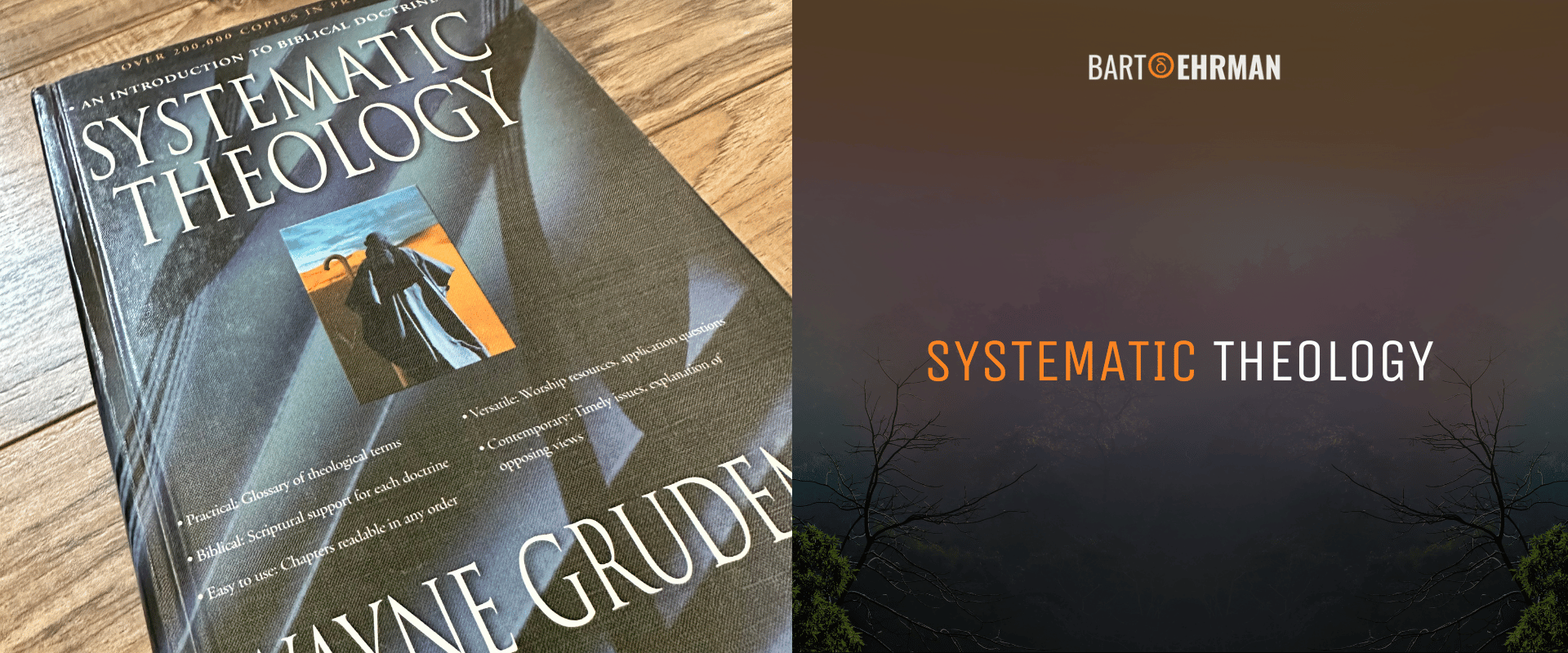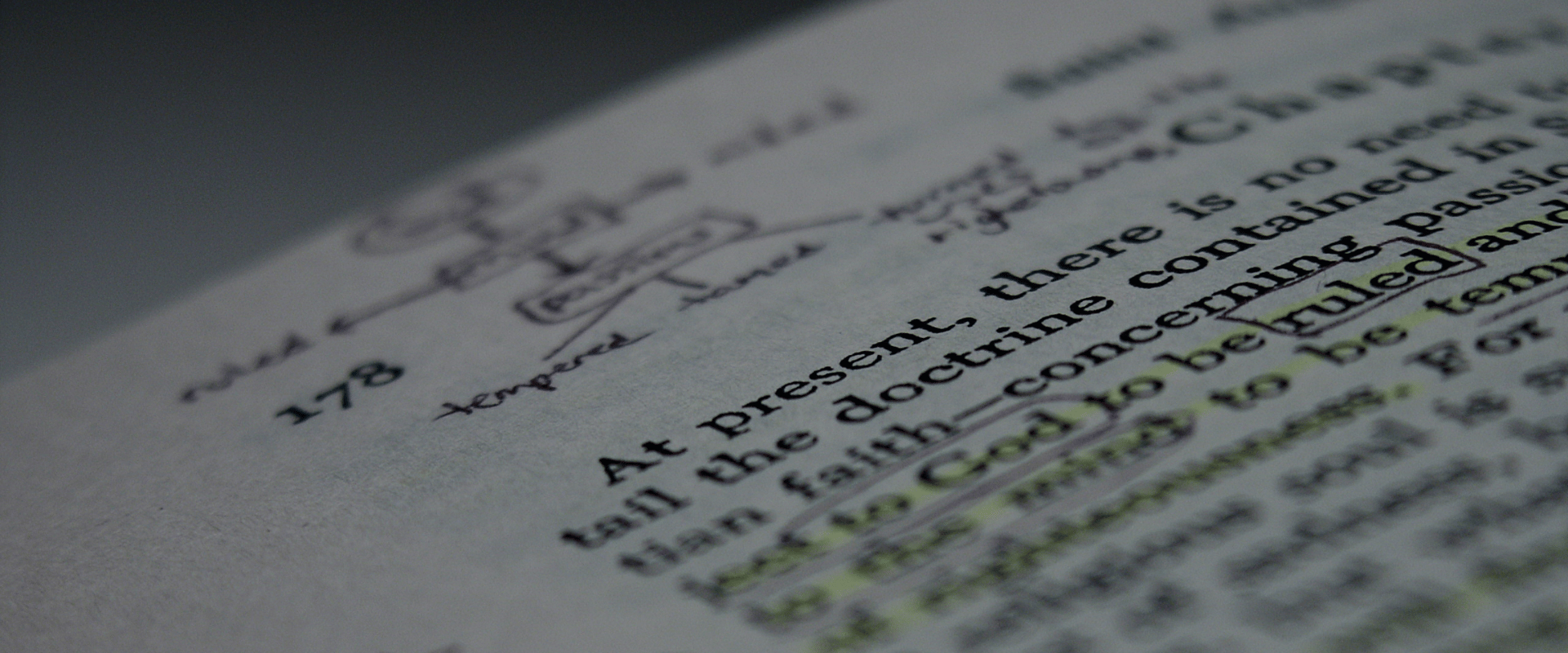Systematic Theology: HISTORY AND DEFINITION

Written by Joshua Schachterle, Ph.D
Author | Professor | Scholar
Author | Professor | BE Contributor
Verified! See our editorial guidelines
Verified! See our guidelines
Date written: August 6th, 2024
Disclaimer: The views and opinions expressed in this article belong to the author and do not necessarily match my own. - Dr. Bart D. Ehrman
What is systematic theology? It’s a modern branch of Christian theology based on certain presuppositions about the Bible. As we investigate its history and key figures, I’ll explore where this type of theology began, how it has evolved, and who some of its most influential proponents are.
In addition, I’ll explain the differences between systematic theology and biblical scholarship, two disciplines which are sometimes mistaken for each other.

What is Systematic Theology?
Systematic theology is a type of Christian theology based entirely on reading biblical texts with certain assumptions. It is an attempt to make a consistent interpretation of the principles of Christian faith while using the Bible as the only source. It is almost entirely a product of a specific form of Protestantism, although there is a Catholic version I’ll discuss later.
When biblical scholars study the Bible, they look for its historical value, interpreting each writing in light of what they know about the culture and languages from which it emerged, the sociopolitical situation in which it was written, and a host of other historical factors. When systematic theologians write about the Bible, on the other hand, they are looking for advice on how to live today and what to believe.
Many forms of Protestantism, and particularly Evangelical Protestantism, take Martin Luther’s doctrine of sola scriptura, or “Scripture alone” very seriously. This is the principle that the canonical Bible is the only basis of divine revelation. As such, it is considered the God-inspired, inerrant, and absolutely consistent source of faith and practice. I’ll say more about this doctrine later on.
Wayne Grudem is one of systematic theology’s key figures and thinkers. In his book Systematic Theology: An Introduction to Biblical Doctrine, Grudem gives the following simplified definition: (Affiliate Disclaimer: We may earn commissions on products you purchase through this page at no additional cost to you. Thank you for supporting our site!)
Systematic theology is any study that answers the question, “What does the Bible teach us today?” about any given topic.
This definition indicates that systematic theology involves collecting and understanding all the relevant passages in the Bible on various topics and then summarizing their teachings clearly so that we [Christians] know what to believe about each topic.
By this definition, systematic theology is a form of biblical theology, basing its beliefs entirely on a collection of various biblical quotations on any given theme and interpreting them as entirely coherent. James Garrett adds to this definition in Systematic Theology : Biblical, Historical, and Evangelical, saying that systematic theology also can incorporate historical theology, the study of the history of Christian doctrine. As we’ll see, some systematic theologians disagree with this, rejecting historical data altogether.
The website of The Grace Institute for Biblical Leadership adds that there are sub-categories within systematic theology, topics which it addresses according to its method, including the following:
Theology Proper – The study of the character of God.
Bibliology – The study of the Bible.
Christology – The study of Christ.
Pneumatology – The study of the Holy Spirit.
Soteriology – The study of salvation.
Anthropology – The study of the nature of humanity.
Angelology – The study of angels.
Ecclesiology – The study of the church.
Eschatology – The study of the end times.
Before discussing key figures in systematic theology, I want to discuss what biblical scholars say about the two key assumptions of systematic theology: biblical inerrancy, and biblical univocality.
What Are Biblical Inerrancy and Univocality?
In Defending Inerrancy: Affirming the Accuracy of Scripture for a New Generation, Norman Geisler and William Roach define inerrancy as the belief that the Bible "is without error or fault in all its teaching." The abovementioned Wayne Grudem adds that inerrancy says "Scripture in the original manuscripts does not affirm anything that is contrary to fact." In other words, biblical inerrantists, including systematic theologians, believe that every teaching in the Bible is theologically and morally correct and that every historical event occurred as described. There are many problems with this approach.
Scholars have known for many years that the events described in the Bible are not entirely historical. For instance, they almost universally say that a large-scale Israelite exodus from Egypt never happened. In Five Views on the Exodus: Historicity, Chronology, and Theological Implications, Ronald Hendel notes not only there is no archeological evidence for a large Israelite presence in Egypt but also that the ruins of early Israelite settlements hold absolutely no evidence of Egyptian influence.
In addition, in Reading Acts: A Literary and Theological Commentary, Charles Talbert notes that the description of Paul’s ideas and activities in the book of Acts differs markedly from Paul’s own descriptions of his ideas and activities in his letters.
These are just two of the many, many instances in which biblical scholars have proved that the Bible is not historically accurate. However, the other assumption, Biblical univocality, on which systematic theology is based, is even more difficult to defend.
In The Rise And Fall Of The Bible: The Unexpected History of an Accidental Book, Timothy Beal writes that “it is important to remember that the Bible is not a single book… but rather a collection of books – or, more accurately, a collection of writings, since none of them were originally published as books.” For this reason, Beal suggests that rather than a book, the Bible should be called a library, a collection of different texts by many different authors in different times with different perspectives. If this is the case, asking what the Bible says about a topic is like asking “What does the library say about this topic?” Obviously, it says many different things.
If one reads the Bible without the assumption that it is univocal, that is, speaking with one voice and perspective, it becomes clear that it contains many voices, many of which contradict each other. As an example, in Matthew 5:39, Jesus tells people not to respond violently to violence: “Do not resist an evildoer. But if anyone strikes you on the right cheek, turn the other also.” And yet in Revelation 19, Jesus is shown wearing a bloody robe and wielding a sword to “strike down the nations.” How can Jesus be both violent and non-violent?
Additionally, in Misquoting Jesus: The Story Behind Who Changed the Bible and Why, Bart Ehrman points out that not only do we not have a single original manuscript of any biblical text (remember that Grudem refers to “the original manuscripts” as inerrant) but that among the manuscripts we do have, “There are more variations among [them] than there are words in the New Testament.” If this is so, how are we to know for certain which version of any biblical text is the original, and thus divinely inspired, version?
Having established the scholarly view of the two foundational assumptions of systematic theology, I’ll now look into its history and some of its key thinkers.
Systematic Theology 101
As a historian of early Christianity, I was never required to take any courses in systematic theology. However, if a person in seminary did take such a course, the following is what might be included on the syllabus.
Although they never used the term systematic theology, certain early Christian authors did try to formulate coherent Christian doctrines. Clement of Alexandria, for instance, used numerous biblical texts in his book The Protrepticus to argue that Greek religion was a natural early phase of human development, while Christianity was the culmination of a mature understanding of the universe. Clement’s student Origen of Alexandria used biblical texts similarly in his book On First Principles, to argue for a deeper, spiritual interpretation of those texts.
With the Protestant Reformation in the 16th century, systematic theology, although not yet called by that name, was the method of Philipp Melanchthon's Loci Communes, a book which created a thematic, methodical explanation of Christian theology. Another example of this in early Protestant history was John’s Calvin’s Institutes of the Christian Religion. Calvin’s influence on systematic theology remains important today.
However, systematic theology as we now know it was actually developed much more in the 19th and 20th centuries. Here I’ll examine a few of those key figures and their contributions to systematic theology.
Charles Hodge (December 27, 1797- June 19, 1878)
Hodge was a Presbyterian theologian and the head of the Princeton Theological Seminary from 1851-1878. He was also a highly prolific author, writing many works on theology and the Bible. His greatest work was Systematic Theology consisting of three volumes and 2,260 pages. In this massive work, Hodge used his considerable knowledge of biblical passages to attempt to formulate a consistent Christian doctrine.
It is important to note that Hodge, like most other writers on systematic theology, was a committed Calvinist in his theology which, of course, affected how he interpreted the biblical texts. The Calvinist church is called the Reformed Church, which is why systematic theology is often called Reformed systematic theology. If you’re not familiar with the basic doctrines of John Calvin, one of the earliest Protestant thinkers, they are usually summed up in these five points (with a helpful acronym: TULIP).
Hodge, and most Protestant systematic theologians, fully believed all these points and used biblical texts to prove they were correct.
Louis Berkhof (October 13, 1873- May 1, 1957)
Berkhof was a Dutch-American theologian in the Reformed Church, also known as the Calvinists. His writings on Reformed systematic theology were influential in seminaries all over the world in the 20th century. Born in the Netherlands, he moved with his family to Michigan as a child and spent the rest of his life in the United States.
He taught for 40 years at the Calvin Theological Seminary, eventually becoming its president. He wrote 22 books, among which is his Systematic Theology, written in 1932. While this work largely followed the standard model of Calvinism, its thoroughness and use of biblical proof texts were incredibly influential in Calvinist and Evangelical circles. While it is an attempt to provide a coherent and rational theology, Berkhof also wrote that “Ratiocination [that is, reasoning] is a relatively superficial and unreal path to the deity.”

John Frame (born April 8, 1939)
In the 21st century, few systematic theologians are as influential as John Frame. He is an American Christian philosopher and Calvinist theologian who has written extensively on epistemology (the study of what constitutes knowledge), systematic theology, and ethics.
Frame has been openly critical of any attempts to look to Christian history as a means to develop theology. In Systematic Theology: An Introduction to Christian Belief, he uses biblical proof texts, again presupposing that the Bible is univocal, to explain how, in his opinion, the Bible explains God’s entire plan for humans from Adam to the end of time. While this is not a new idea, Frame also has a background in Western philosophy, so his contribution includes addressing philosophical objections to this view of the Bible.
Stephen Wellum (no dates available)
Wellum has long been a professor of Christian Theology at Southern Baptist Theological Seminary in Louisville, Kentucky. While technically not a member of the Reformed or Calvinist church, his views are as openly Calvinist as the others in this list. His 1,000-page Systematic Theology: From Canon to Concept, while not an easy read, is admirably thorough, both in scope and detail.
Wellum’s theology, like those above, sticks generally to Calvinist lines or TULIP. However, in addition to his book on Reformed systematic theology, Wellum has written books in which he reaffirms some ancient doctrines of Christianity, while still fusing them with modern Calvinist principles. This use of historical information makes him unique among systematic theologians.
Francis A. Sullivan (May 21, 1922- October 23, 2019)
While by and large, systematic theology is a Calvinist, Protestant endeavor, there have been attempts by modern Catholics to systematize their theology as well. In The Church We Believe In: One, Holy, Catholic and Apostolic, Francis Sullivan, a Jesuit priest and theologian, wrote about how Catholic theology relies not only on the Bible but also on the traditions passed down by the Catholic Church.
This, of course, gives Sullivan more sources to work with. Instead of having to interpret biblical passages alone, he included papal decrees and the rulings of Church Councils as well.
Conclusion
What is systematic theology? Classically, it begins with the doctrine of sola scriptura, the idea that the Bible is the only source of divine revelation. Systematic theologians choose topics and then search out biblical texts which tell them what to believe, according to Wayne Grudem.
This type of systematization relies on two assumptions: first, it assumes that the Bible is inerrant, having no errors of any kind, factually, doctrinally, or otherwise; second, it assumes that the Bible is univocal, with every biblical writing agreeing with every other biblical writing. Biblical scholars, meanwhile, have long known that neither of these two assumptions is defensible.
Nevertheless, most systematic theologians continue to use their method of biblical interpretation, almost always through the lens of the principles of John Calvin, an early Protestant reformer. Calvin had controversial views even among other Christians. Among these was predestination, the doctrine that God has already decided who will be saved and who will be damned, making human choice all but superfluous.
Prominent Calvinist theologians still propagate this version of theology, rejecting the insights of biblical scholars and interpreting biblical texts not to understand their origins but to determine what modern Christians should believe and how they should live.
FREE COURSE!
WHY I AM NOT A CHRISTIAN
Raw, honest, and enlightening. Bart's story of why he deconverted from the Christian faith.
Over 6,000 enrolled!

